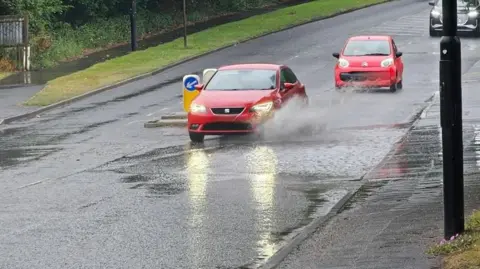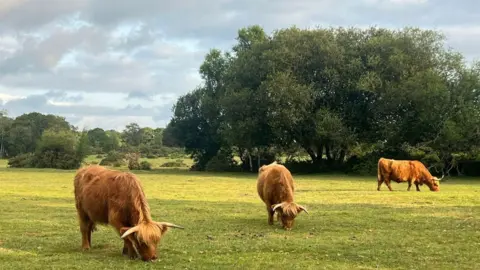Heatwave over but new hosepipe ban announced
 PA Media
PA MediaTemperatures have cooled as the UK's third heatwave of this year comes to an end, while a new hosepipe ban affecting 1.1 million people has been announced.
Monday will feel fresher than recent days, with highs between 18C and 24C (64F and 75F) for most of the UK.
There will be heavy rain in Scotland and frequent showers in Northern Ireland, while the south of England will remain largely dry with possible isolated showers.
Thames Water said a hosepipe ban was due to start on 22 July in Swindon, Gloucestershire, Oxfordshire and parts of Berkshire because of a lack of rain and increasing demand, which had stretched supplies.
 BBCWeatherWatchers/sunflowerdeb16
BBCWeatherWatchers/sunflowerdeb16The shift in weather is due to an area of low pressure bringing rain and cool air from the Atlantic.
This follows a sweltering three-day stretch in which temperatures soared well above average with 34.7C in Astwood Bank, Worcestershire, on Friday, 33.1C in Cardiff on Saturday and 31.2C in Achnagart in the Scottish Highlands on Sunday.
The hosepipe ban announced by Thames Water follows England's warmed June on record, as well as the driest and sunniest spring in more than a century.
It restricts non-essential hosepipe use - such as watering gardens, washing cars, or filling paddling pools - as reservoir levels drop due to a prolonged spell of dry weather.
Another hosepipe ban, affecting more than 1.4 million South East Water customers across Kent and Sussex, will come into force on 18 July.
Meanwhile, the first hosepipe ban of the year, affecting much of Yorkshire, parts of north Lincolnshire and parts of Derbyshire, began on Friday
The bans follow the expiry of the amber and yellow heat health alerts issued by the UK Health Security Agency across England.
 BBC Weather Watchers/Figaro
BBC Weather Watchers/FigaroWhile most of the UK enjoys some relief from the heat, south-east England will still see warm conditions with highs of up to 28C - however this is below the official heatwave threshold.
The cooler pattern is expected to continue into Tuesday and the change in temperature will be more notable with highs between 18 and 21C.
There will be heavy rain in parts of Northern Ireland, southern Scotland, Wales and northern England.
The rain will break up into more showery conditions as it moves into central and south-eastern areas, but most areas will see some rainfall.
Looking ahead, temperatures are forecast to rise again towards the end of the week, particularly in central and south-eastern England.
Highs could approach 30C again by Friday or Saturday.
 BBCWeatherWatchers/markie B
BBCWeatherWatchers/markie BIt comes as the Met Office has issued a warning that spells of extreme weather are becoming increasingly frequent.
A new report released on Monday highlights how the UK is breaking temperature and rainfall records more often, attributing the trend to climate change.
With hotter, drier summers and wetter, stormier winters, Britain's climate is shifting and the impact is being felt not only in cities, but across the natural world, where species are struggling to adapt.
